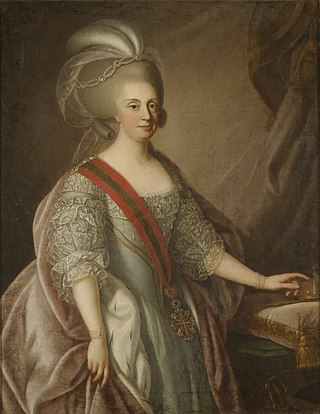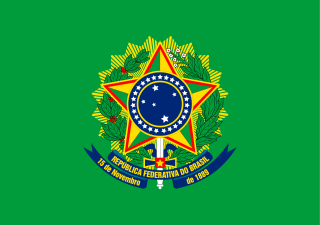Related Research Articles
Francisco Álvares was a Portuguese missionary and explorer. In 1515 he traveled to Ethiopia as part of the Portuguese embassy to emperor Lebna Dengel accompanied by returning Ethiopian ambassador Matheus. The embassy arrived only in 1520 to Ethiopia where he joined long sought Portuguese envoy Pêro da Covilhã. There he remained six years, returning to Lisbon in 1526-27 having written a report entitled Verdadeira Informação das Terras do Preste João das Índias.

Dona Maria I was Queen of Portugal from 24 February 1777 until her death in 1816. Known as Maria the Pious in Portugal and Maria the Mad in Brazil, she was the first undisputed queen regnant of Portugal and the first monarch of Brazil.

The president of Brazil, officially the president of the Federative Republic of Brazil or simply the President of the Republic, is the head of state and head of government of Brazil. The president leads the executive branch of the federal government and is the commander-in-chief of the Brazilian Armed Forces.

The Zhengde Emperor, personal name Zhu Houzhao (朱厚㷖), was the 11th emperor of the Ming dynasty, reigned from 1505 to 1521. He was the Hongzhi Emperor's eldest son. Zhu Houzhao took the throne at only 14 with the era name "Zhengde", meaning "right virtue" or "rectification of virtue".

Isabella of Portugal was Duchess of Burgundy from 1430 to 1467 as the third wife of Duke Philip the Good. Their son was Charles the Bold, the last Valois Duke of Burgundy.

The president of Portugal, officially the president of the Portuguese Republic, is the head of state and highest office of Portugal.

Doña Carlota Joaquina Teresa Cayetana of Spain was Queen of Portugal and Brazil as the wife of King Dom John VI. She was the daughter of King Don Charles IV of Spain and Maria Luisa of Parma.

The Chamber of Deputies is a federal legislative body and the lower house of the National Congress of Brazil. The chamber comprises 513 deputies, who are elected by proportional representation to serve four-year terms. The current President of the Chamber is the Deputy Arthur Lira (PP-AL), who was elected on 1 February 2021.

The Iberian Union is a historiographical term used to describe the dynastic union of the Monarchy of Spain, which in turn was itself a dynastic union of the crowns of Castile and Aragon, and the Kingdom of Portugal, and of their respective colonial empires, that existed between 1580 and 1640 and brought the entire Iberian Peninsula except Andorra, as well as Portuguese and Spanish overseas possessions, under the Spanish Habsburg monarchs Philip II, Philip III, and Philip IV. The union began after the Portuguese crisis of succession and the ensuing War of the Portuguese Succession, and lasted until the Portuguese Restoration War, during which the House of Braganza was established as Portugal's new ruling dynasty with the acclamation of John IV as the new King of Portugal.

Joanna of Portugal, OP was a Portuguese regent princess of the House of Aviz, daughter of King Afonso V of Portugal and his first wife Isabel of Coimbra. She served as regent during the absence of her father in 1471. She is venerated in the Catholic Church.

Diogo Gomes was a Portuguese navigator, explorer and writer. Diogo Gomes was a servant and explorer of Portuguese prince Henry the Navigator. His memoirs were dictated late in his life to Martin Behaim. They are an invaluable account of the Portuguese discoveries under Henry the Navigator, and one of the principal sources upon which historians of the era have drawn. He explored and ascended up the Gambia River in West Africa and discovered some of the Cape Verde islands.

The judiciary of Portugal is a system of courts that together constitute one of the four organs of Sovereignty as defined by the Portuguese Constitution. The courts are independent from the other three Portuguese organs of Sovereignty.
Tomé Pires was a Portuguese apothecary, colonial administrator, and diplomat. In 1510 he was commissioned by the Portuguese court to serve as a "factor of drugs" in India, arriving at Cannanore in 1511. In 1512 he was sent to the port city of Malacca, recently captured by the Portuguese. There he served as the chief accountant for the royal factory. Upon his return to India in 1515, Pires was sent to China as ambassador from the King of Portugal to the Ming Court. His mission was a failure when the Chinese court refused to recognize him because of the increasingly hostile activities of Portuguese traders in the region. Pires never left China; he was either executed by the Chinese in 1524 or possibly banished for life to a remote Chinese province.

A chamberlain is a senior royal official in charge of managing a royal household. Historically, the chamberlain superintends the arrangement of domestic affairs and was often also charged with receiving and paying out money kept in the royal chamber. The position was usually awarded as an honour to a high-ranking member of the nobility (nobleman) or the clergy, often a royal favourite. Roman emperors appointed this officer under the title of cubicularius. The Chamberlain of the Holy Roman Church enjoys very extensive powers, having the revenues of the papal household under his charge. As a sign of their dignity, chamberlains bore a key, which in the seventeenth century was often silvered, and actually fitted the door-locks of chamber rooms. Since the eighteenth century, it has turned into a merely symbolic, albeit splendid, rank-insignia of gilded bronze. In many countries there are ceremonial posts associated with the household of the sovereign.
TAP Air Portugal is the flag carrier of Portugal, headquartered at Lisbon Airport which also serves as its hub. TAP – Transportes Aéreos Portugueses – has been a member of the Star Alliance since 2005 and operates on average 2,500 flights a week to 90 destinations in 34 countries worldwide. As of May 2019 the company has a fleet of 100 aircraft, all of which are manufactured by Airbus with the exception of 19 aircraft manufactured by Embraer, operating on behalf of the regional airline TAP Express.

Parameswara, thought to be the same person named in the Malay Annals as Iskandar Shah, was the last king of Singapura and the founder of Malacca. According to the Malay Annals, he ruled Singapura from 1389 to 1398. The king fled the island kingdom after a Majapahit naval invasion in 1398 and founded his new stronghold on the mouth of Bertam river in 1402. Within decades, the new city grew rapidly to become the capital of the Malacca Sultanate. Portuguese accounts however, written a hundred years after his death, suggest he was from Palembang in Sumatra and usurped the throne of Singapura; he was driven out, either by the Siamese or the Majapahit, and went on to found Malacca.

The impeachment of Dilma Rousseff, the 36th president of Brazil, began on 2 December 2015 with a petition for her impeachment being accepted by Eduardo Cunha, then president of the Chamber of Deputies, and continued into late 2016. Dilma Rousseff, then more than 12 months into her second four-year term, was charged with criminal administrative misconduct and disregard for the federal budget in violation of article 85, items V and VI, of the Constitution of Brazil and the Fiscal Responsibility Law, Article 36. The petition also accused Rousseff of criminal responsibility for failing to act on the scandal at the Brazilian national petroleum company, Petrobras, on account of allegations uncovered by the Operation Car Wash investigation, and for failing to distance herself from the suspects in that investigation.

Alexandre de Moraes is a Brazilian jurist, currently serving as president of the Superior Electoral Court and as a justice of the Supreme Federal Court.

Ellen or Elen More was an African servant at the Scottish royal court. She probably arrived in Scotland in the company of a Portuguese man with imported animals. There are records of clothing and gifts given to her, although her roles and status are unclear. Some recent scholarship suggests she was enslaved, and her arrival in Scotland can be linked indirectly with the slave trade. She is associated with a racist poem by William Dunbar, and may have performed in Edinburgh as the "Black Lady" at royal tournaments in 1507 and 1508.